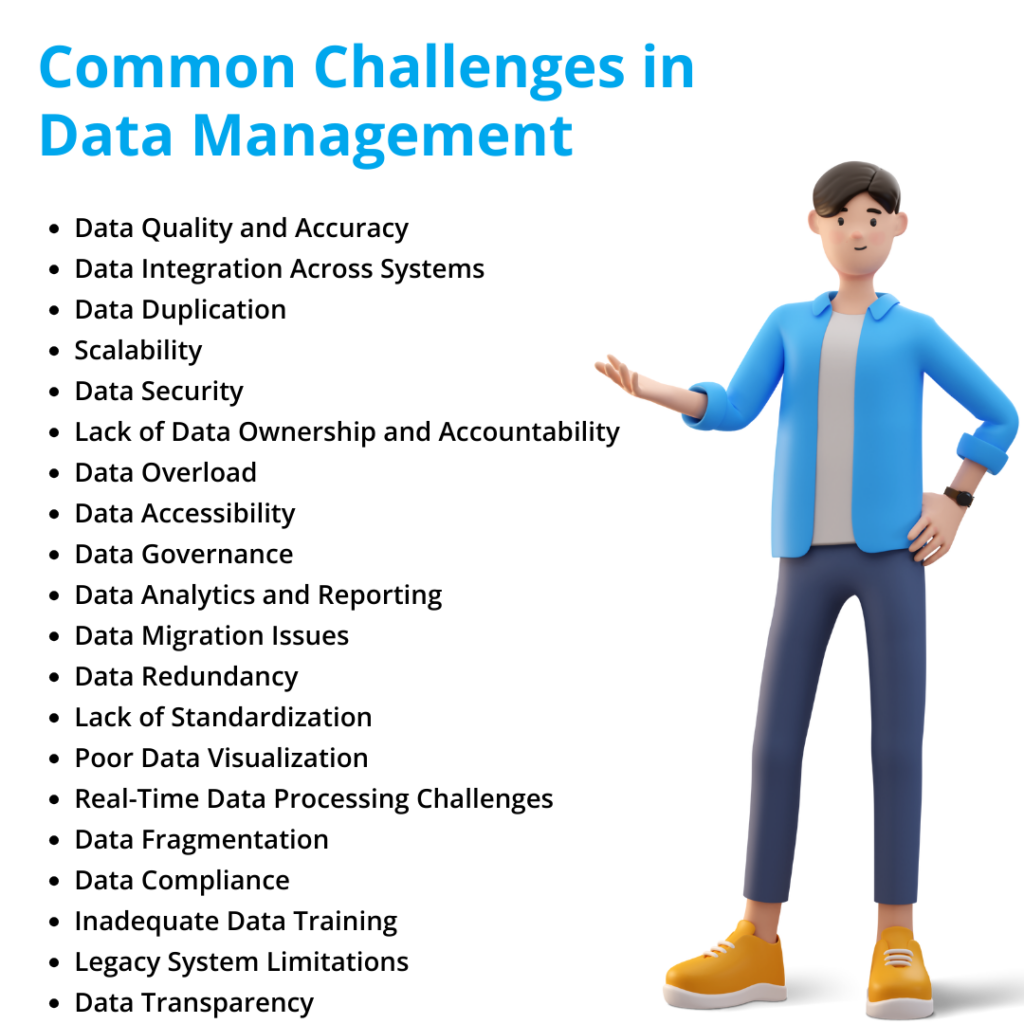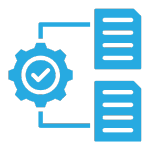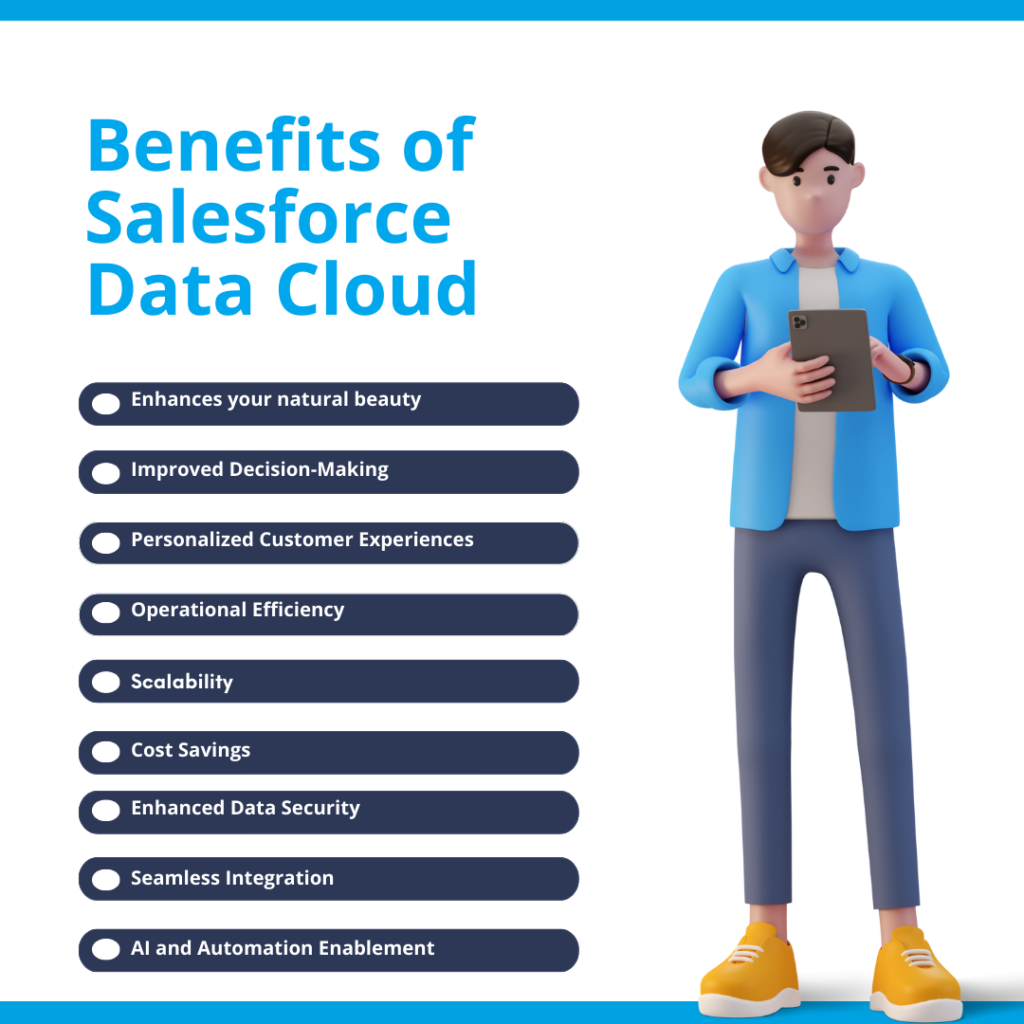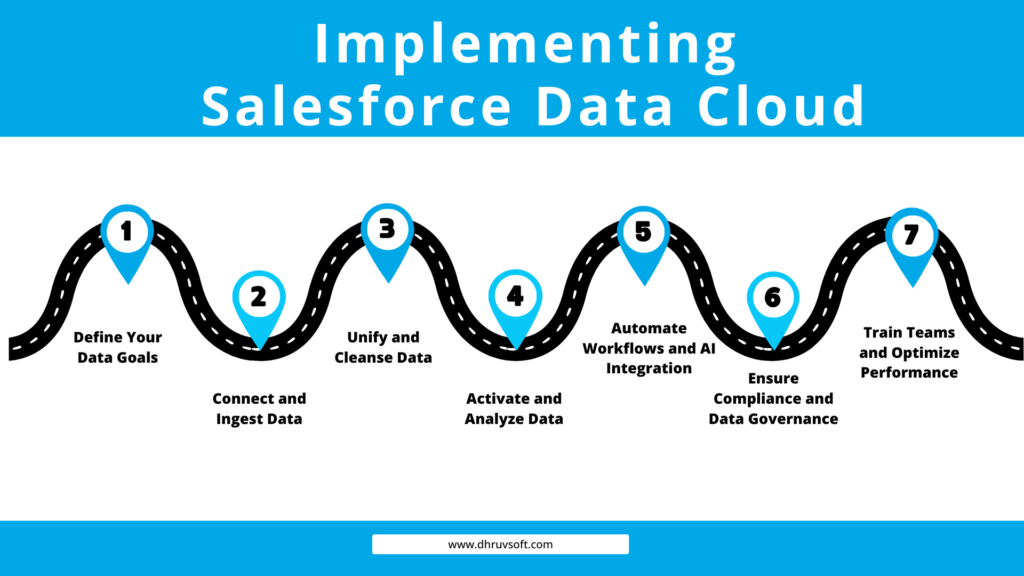
Salesforce Data Cloud – The Future of Intelligent Data Management
Connect, Harmonize, and Activate Your Data Seamlessly
Salesforce Data Cloud is a powerful, unified customer data platform designed to collect, aggregate, and analyze customer data in real time. Its main goal is to help businesses create personalized, data-driven experiences for their customers by offering a comprehensive 360-degree view of each customer. Data Cloud connects various customer data touch points such as CRM systems, eCommerce platforms, and social media channels to deliver a seamless customer experience.
The platform consolidates customer information from multiple sources and ensures that businesses can use this data to understand their customers better, make smarter decisions, and deliver customized services that drive loyalty and growth.
Common Challenges in Data Management
- Data Quality and Accuracy: Ensuring that data is accurate, up-to-date, and free from errors is one of the most fundamental challenges businesses face. Poor-quality data can lead to flawed decision-making and decreased operational efficiency. If customer information is inaccurate, businesses may make misguided decisions that ultimately harm customer relationships and affect bottom-line results.
- Data Integration Across Systems: As businesses use a variety of platforms (CRM, ERP, marketing tools), integrating data across these systems becomes challenging. Differences in data formats and incompatible systems can lead to issues in creating a cohesive, unified customer profile. Proper integration is essential to make sure that businesses have a comprehensive, accurate view of each customer.
- Data Duplication: Duplicate data records within CRM systems create problems in reporting accuracy, analytics, and resource allocation. Duplicate information can result in skewed reports, lost opportunities, and wasted resources, making it harder for businesses to identify key insights or serve customers effectively.
- Scalability: As businesses grow, the volume and complexity of their data expand. Ensuring that systems can scale to handle increasing amounts of data without compromising performance, accuracy, or accessibility is critical. Businesses need systems that can grow with them.
- Data Security: Protecting sensitive customer information from unauthorized access is an ongoing challenge. Organizations must implement robust security measures to maintain data integrity and comply with regulatory standards such as GDPR or HIPAA.
- Lack of Data Ownership and Accountability: In some organizations, unclear data ownership leads to inconsistent handling of customer information. Establishing clear roles and responsibilities for data governance is crucial to ensure that data is managed correctly, with appropriate quality standards and consistent practices.
- Data Overload: The amount of data businesses generate daily can become overwhelming. It is vital to identify and prioritize valuable data while managing the vast volume of information that may not provide actionable insights.
- Data Accessibility: Timely access to data is key to informed decision-making. However, organizational silos and poor data-sharing practices can impede access. Data should be accessible to the right people at the right time, empowering teams to act quickly and effectively.
- Data Governance: Establishing clear policies and procedures around data management is essential for maintaining consistency, accuracy, and compliance. A robust data governance framework ensures that data is handled with care, maintained with integrity, and used responsibly.
- Data Analytics and Reporting: Extracting meaningful insights from data and generating accurate reports can be challenging. Businesses must have the right tools and processes in place to analyze data and convert it into actionable intelligence for informed decision-making.
- Data Migration Issues: Moving data between systems during upgrades or transitions can lead to errors or incomplete transfers, causing disruptions in business operations.
- Data Redundancy: Storing the same data in multiple locations increases storage costs and can cause confusion, leading to inconsistent reporting and analysis.
- Lack of Standardization: Different departments using inconsistent data formats or categories make it difficult to consolidate data, resulting in misaligned or conflicting information.
- Poor Data Visualization: With large volumes of complex data, businesses can struggle to present data in an easily digestible format, making it harder for teams to extract insights quickly.
- Real-Time Data Processing Challenges: Processing data in real-time can be difficult, especially when handling large datasets, resulting in delays or the inability to act on timely information.
- Data Fragmentation: Data being siloed across various departments, systems, or platforms creates gaps in the full customer view, making it harder to make informed decisions or deliver a personalized experience.
- Data Compliance: Ensuring that all data practices meet regulatory requirements like GDPR or HIPAA can be challenging, especially when managing large volumes of sensitive customer data across different regions.
- Inadequate Data Training: Lack of proper training for employees on data tools and management processes leads to mistakes, poor data handling, and missed opportunities for data-driven decisions.
- Legacy System Limitations: Older systems may not be able to integrate with modern technologies or handle current data volumes, making it difficult to extract and manage data efficiently.
- Data Transparency: Limited visibility into how data is being used or processed across the organization can hinder trust and accountability, making it harder to ensure data integrity.
Key Features of Salesforce Data Cloud

Open Platform Integration
Salesforce Data Cloud seamlessly connects data from various sources, including cloud providers, mobile applications, and over 300+ sources through MuleSoft. This integration ensures that businesses can bring in data from a variety of touchpoints, unifying it for better insights and decisions.

Real-Time Data Processing
Data Cloud enables businesses to ingest and act on data in real-time, delivering personalized customer experiences instantly. By processing data as it comes in, businesses can make smarter decisions and respond to customer needs more quickly.

Identity Resolution
By unifying customer profiles across different data sources, Salesforce Data Cloud ensures that businesses get a comprehensive, accurate view of each customer. This capability uses matching and reconciliation rules to create a unified profile.
Benefits of Data Cloud
- Enhanced Customer Understanding: By unifying data from diverse sources, Data Cloud offers a complete 360-degree view of each customer, giving businesses deeper insights into customer behavior and preferences. This understanding allows businesses to engage with customers more effectively.
- Improved Decision-Making: Access to comprehensive, harmonized data enables better decision-making. Businesses can make more informed, timely decisions that improve operational efficiency and drive business growth.
- Personalized Customer Experiences: Data Cloud helps businesses tailor interactions and offerings to individual customer needs, improving satisfaction and loyalty. A unified view of each customer ensures that businesses can engage them in a more meaningful way.
- Operational Efficiency: By automating workflows and processes, Salesforce Data Cloud reduces manual efforts, minimizes errors, and accelerates the time-to-market for new initiatives. This leads to significant cost savings and operational improvements.
- Scalability: Salesforce Data Cloud is built to scale with businesses as they grow. Its flexible architecture ensures that businesses can handle increasing data volumes without compromising on performance, making it a long-term solution.
- Cost Savings: The platform eliminates the need for multiple data pipelines and disparate systems, helping businesses reduce costs. By centralizing data management, Data Cloud simplifies infrastructure and streamlines processes.
- Enhanced Data Security: With Salesforce’s robust security features, Data Cloud ensures that customer data is protected from unauthorized access and breaches. The platform meets industry compliance standards, safeguarding customer trust.
- Seamless Integration: Salesforce Data Cloud integrates effortlessly with existing Salesforce applications and external systems, preserving prior investments and enhancing the value of existing tools.
- AI and Automation Enablement: The platform’s capabilities support AI model development and automation, enabling businesses to implement cutting-edge solutions and maintain a competitive edge in the market.
Salesforce Data Cloud Use Cases for Your Industry
Salesforce Data Cloud revolutionizes how businesses harness real-time data to drive customer engagement, optimize operations, and enhance decision-making. Below are industry-specific use cases showcasing its transformative capabilities.
Industry
Financial Services
Use Case
- Personalized Wealth Management: Leverage AI-powered insights for tailored financial recommendations.
- Fraud Detection & Risk Management: Use real-time data unification to detect suspicious activities and prevent fraud.
- Customer 360 for Banking: Provide a seamless omnichannel experience by unifying customer interactions across banking touchpoints.
Healthcare & Life Sciences
- Patient Engagement & Personalized Care: Integrate data from EHRs, wearables, and patient history for proactive healthcare.
- Regulatory Compliance & Data Governance: Ensure HIPAA compliance while managing sensitive patient data.
- AI-Driven Clinical Insights: Enhance clinical trials and treatment plans using predictive analytics.
Automotive
- Connected Vehicle Data: Analyze telematics and IoT data for predictive maintenance and enhanced customer experience.
- Smart Inventory Management: Optimize spare parts logistics using AI-driven forecasting.
- Targeted Marketing for Dealers: Enable hyper-personalized promotions based on customer behavior.
Education
- Student Lifecycle Management: Track engagement and performance for better student outcomes.
- Personalized Learning Paths: Use AI to recommend tailored educational content.
- Alumni & Donor Engagement: Strengthen relationships with past students and donors using real-time data.
Consumer Goods
- Demand Forecasting: Leverage AI models to optimize inventory and distribution.
- Personalized Marketing Campaigns: Engage customers with data-driven product recommendations.
- Retailer Relationship Management: Strengthen partnerships with distributors and retailers through data insights.
Media & Entertainment
- Audience Insights & Content Personalization: Deliver hyper-relevant content using AI-driven recommendations.
- Ad Monetization & Campaign Effectiveness: Optimize ad targeting through behavioral analytics.
- Subscription Management: Improve retention rates with predictive engagement analytics.
Non-Profit Organizations
- Donor Engagement & Fundraising Optimization: Use AI to identify high-value donors and automate outreach.
- Volunteer Management: Streamline coordination and engagement through data-driven insights.
- Impact Reporting: Track and visualize impact metrics for stakeholders and grants.
Retail & Ecommerce
- Real-Time Customer Segmentation: Drive hyper-personalized shopping experiences.
- Omnichannel Engagement: Unify online and offline customer journeys for seamless interactions.
- AI-Driven Product Recommendations: Increase sales with intelligent merchandising strategies.
Hospitality & Travel
- Personalized Guest Experiences: Use AI to offer tailored recommendations and seamless service.
- Loyalty Program Optimization: Leverage customer behavior data to enhance rewards programs.
- Dynamic Pricing Strategies: Optimize room rates and travel packages using real-time demand data.
Real Estate
- Smart Property Management: Leverage AI to predict tenant needs and optimize building operations.
- Personalized Buyer & Renter Experiences: Use data intelligence to match properties with customer preferences.
- Market Trend Analysis: Predict real estate trends using historical and real-time data.
Pharmaceuticals
- Drug Development Acceleration: Enhance R&D with real-time data analytics.
- Pharmacovigilance & Compliance: Ensure drug safety monitoring using AI.
- Sales & Marketing Optimization: Personalize physician outreach using data intelligence.
Insurance
- Fraud Detection & Claims Automation: Leverage AI to detect fraudulent activities in real-time.
- Policy Personalization: Tailor insurance plans based on customer behavior and risk assessment.
- Customer Retention Strategies: Use predictive analytics to improve customer satisfaction and renewals.
Communications & Telecom
- Customer Experience Optimization: Reduce churn by analyzing usage patterns and service quality.
- AI-Driven Customer Support: Automate ticket resolution using AI insights from real-time data
Implementing Data Cloud
Salesforce Data Cloud helps businesses unlock the power of real-time data to drive customer insights, improve engagement, and optimize operations. A successful implementation ensures that organizations seamlessly integrate, unify, and activate data across their entire tech ecosystem.
Key Considerations for Implementation
Before implementing Salesforce Data Cloud, businesses must evaluate:
- Data Sources: Identify where data resides (CRM, ERP, marketing automation, external APIs).
- Data Strategy: Define data collection, management, and activation processes.
- AI & Analytics Readiness: Assess existing AI and analytics frameworks.
- Compliance & Security: Ensure adherence to regulations like GDPR, CCPA, and HIPAA.
Implementation Methodology
Define Your Data Goals Step 1: Begin by identifying the key business objectives you want to achieve with Salesforce Data Cloud. These could range from enhancing customer engagement and personalization to leveraging AI for automation or unifying data sources. Establish clear Key Performance Indicators (KPIs) to measure success, such as improved data activation rates, increased customer retention, and revenue growth.
Step 2: Connect and Ingest Data: Integrate data from multiple sources, including CRM, ERP, marketing automation platforms, IoT devices, and external APIs. Salesforce Connectors, APIs, and ETL tools help ensure seamless data flow between systems. Real-time data streaming enables businesses to capture insights as they happen, improving decision-making and responsiveness.
Step 3: Unify and Cleanse Data: Consolidate customer records through identity resolution to remove duplicates and unify profiles. Standardizing and cleansing data improves accuracy and consistency, which is essential for reliable analytics. AI-driven data enrichment enhances customer profiles by filling in missing information and identifying patterns that drive better segmentation and personalization.
Step 4: Activate and Analyze Data: Leverage AI-driven segmentation to create dynamic customer profiles that help deliver personalized experiences. Real-time data activation allows marketing, sales, and service teams to make data-driven decisions instantly. With powerful tools like Einstein AI and Tableau, businesses can analyze trends, predict customer behavior, and uncover insights that fuel growth.
Step 5: Automate Workflows and AI Integration: Enable AI-driven recommendations across sales and marketing functions to improve efficiency and effectiveness. Automating customer journeys within Salesforce Marketing Cloud and Service Cloud ensures seamless, personalized interactions. Predictive insights optimize supply chain management, inventory forecasting, and operational efficiency, helping businesses stay ahead of demand fluctuations.
Step 6: Ensure Compliance and Data Governance: Set up robust data governance frameworks to comply with regulations such as GDPR, CCPA, and HIPAA. Implementing access controls ensures only authorized personnel can view or modify sensitive data. Data retention policies help manage storage effectively, while Salesforce Shield and Security Center provide advanced monitoring to safeguard privacy and security.
Step 7: Train Teams and Optimize Performance: User adoption is key to a successful implementation, making comprehensive training essential. Real-time dashboards and user-friendly reporting tools empower teams to leverage Salesforce Data Cloud effectively. Performance dashboards allow for ongoing monitoring and optimization of data pipelines and AI models to ensure continuous improvement and business value.
1. What is Salesforce Data Cloud, and how does it work?
Salesforce Data Cloud is a real-time customer data platform (CDP) that unifies, organizes, and activates data from multiple sources, providing businesses with a single, 360-degree view of their customers. It collects structured and unstructured data from CRM, ERP, marketing platforms, and IoT devices, enabling AI-driven insights and personalized customer interactions.
2. How is Salesforce Data Cloud different from Salesforce CRM?
While Salesforce CRM focuses on managing customer interactions and workflows, Salesforce Data Cloud acts as a centralized data hub that integrates information from various sources, enriching CRM capabilities with real-time insights, AI-driven analytics, and predictive intelligence for better decision-making.
3. What are the key benefits of implementing Salesforce Data Cloud?
Salesforce Data Cloud enhances data unification, AI-powered insights, real-time personalization, and cross-channel engagement. It enables businesses to improve customer experiences, optimize marketing campaigns, drive sales growth, and streamline operations through intelligent automation and data-driven decision-making.
4. What industries can benefit from Salesforce Data Cloud?
Industries such as financial services, healthcare, retail, manufacturing, telecom, real estate, automotive, media, hospitality, education, and nonprofits can leverage Salesforce Data Cloud to unify customer data, optimize business processes, and enhance engagement strategies.
5. How does Salesforce Data Cloud integrate with other Salesforce products?e
Salesforce Data Cloud seamlessly integrates with Sales Cloud, Service Cloud, Marketing Cloud, Commerce Cloud, and Tableau. This enables businesses to activate customer insights, personalize marketing efforts, automate workflows, and improve data visualization across the entire Salesforce ecosystem.
6. How does Salesforce Data Cloud handle data security and compliance?
Salesforce Data Cloud follows strict security protocols, including encryption, multi-factor authentication, access controls, and data masking. It also supports regulatory compliance with GDPR, CCPA, HIPAA, and other industry-specific regulations, ensuring data privacy and governance.
7. Can Salesforce Data Cloud handle real-time data processing?
Yes, Salesforce Data Cloud is designed for real-time data ingestion, analysis, and activation. Businesses can use it to process and analyze data streams instantly, enabling AI-powered recommendations, predictive analytics, and hyper-personalized customer experiences.
8. What are the AI and analytics capabilities of Salesforce Data Cloud?
Salesforce Data Cloud leverages Einstein AI and Tableau to offer predictive analytics, customer segmentation, behavioral insights, and automated decision-making. It enables businesses to analyze large data sets, identify trends, and drive AI-powered customer engagement.
9. How can businesses ensure a smooth implementation of Salesforce Data Cloud?
Successful implementation requires clear data strategy planning, proper data integration, AI model training, compliance setup, and user training. Working with certified Salesforce implementation partners ensures a seamless transition and maximizes business impact.
10. How much does Salesforce Data Cloud cost?
Salesforce Data Cloud pricing varies based on data volume, features, and custom requirements. Businesses should contact Salesforce or an authorized Salesforce partner to receive a custom quote and pricing details based on their specific needs.
Start Your Salesforce Data Cloud Journey
Unlock the full potential of Salesforce Data Cloud and transform the way you manage, analyze, and activate customer data. Whether you’re looking to enhance customer engagement, streamline operations, or leverage AI-driven insights, our team of certified Salesforce experts is here to help.
We offer end-to-end implementation, customization, integration, and ongoing support to ensure a seamless transition to Salesforce Data Cloud. Get in touch with us today for a free consultation and take the first step toward data-driven business success.








